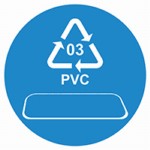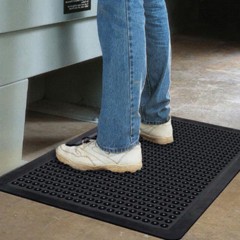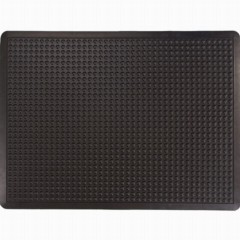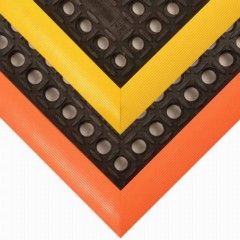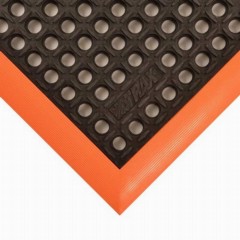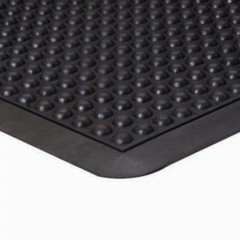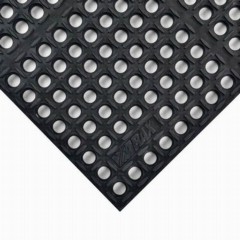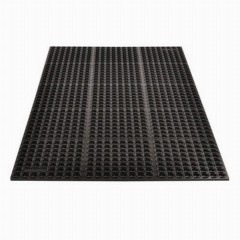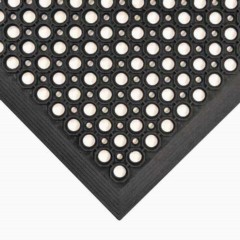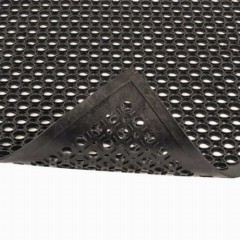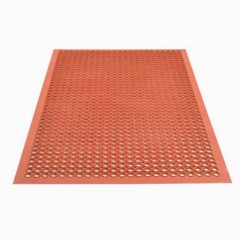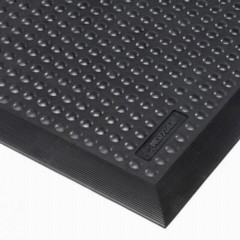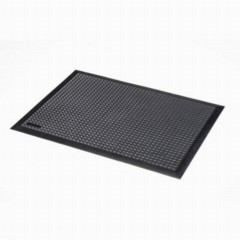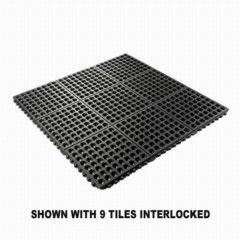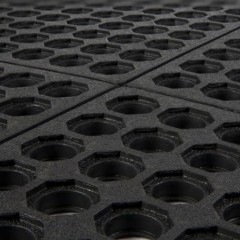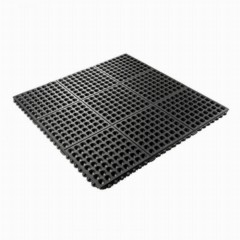Rubber Anti Fatigue Mat Options
Rubber anti fatigue mats offer multiple advantages for use in wet conditions, areas where people must stand all day, and where non-slip flooring is necessary. They’re especially good for kitchen environments, but they also work in other areas where exposure to moisture or greasy substances is possible.
At Greatmats, we have many designs in our rubber anti fatigue mat lineup, and we can help you find the perfect model. Our commercial rubber kitchen mats have several thicknesses and coverage sizes. Our heavy-duty floor mat will give you maximum longevity, thanks to the rubber material. You’ll love the value our rubber fatigue mats deliver – but your workers’ lower leg muscles and joints will love standing on them even more.
Types of Rubber Anti Fatigue Mats
Our list of rubber standing mat products is available in several different types and designs.
Surface Design
Rubber anti fatigue mats are naturally slip-resistant and include flat-bottom, non-skid designs. However, our rubber fatigue mats offer some particular design options in the surface, including:
- Perforated: The Cushion Tred Mats have large perforated holes that encourage drainage.
- Gritty surface: Some of the Safety TruTread perforated mats also have a GritTuff surface that provides maximum slip resistance.
- Raised bubble: Bubble Flex Fatigue Mats use a raised bubble-shaped surface to encourage movement in the legs.
Edge Options
Select among interlocking or beveled edges in certain models of large rubber kitchen mats.
- Interlocking: The Wearwell 24/Seven GR Perforated Mats use interlocking nubs on the edges that allow you to create a greater coverage size. They’re also resistant to grease.
- Beveled edge: Safety Stance Mats and Safety TruTread Mats both have a beveled edge with an orange or yellow color that warns people about the edge.
Resistance to Substances
Rubber is naturally resistant to water, but some of these designs offer resistance to other substances, too.
- Water: The WorkStep Black Mats have perforations to drain water as well as nibs on the bottom that elevate the base of the mat for more efficient drainage. The WorkStep Red Mats have a similar design but offer grease resistance.
- Chemicals: SaniTop Black Mats have a resistance to harsh chemicals, making them ideal for many use cases.
- Grease: SaniTop Red Mats and TruTread Black Mats have perforations and a grease-resistant design for use in kitchens.
- Grease and oil: TruTread Red Mats are resistant to both grease and petroleum oil for use in machine or auto shops.
- Mineral oils: The Wearwell 24/Seven CFR Perforated Mats use interlocking edges that allow you to create a greater coverage size. They’re also resistant to mineral oil-based fluids.
- Electrostatic discharge: The SkyStep ESD Mats have static dissipative properties along with ergonomic advantages.
Coverage Sizes
Most of these rubber mats are rectangular. 2x3, 3x5, and 3x4 anti fatigue mats are common sizes, but we have many more coverage options than the basic sizes.
- Square: The Wearwell 24/Seven CFR NBR Perforated Mats have a 3x3-foot size with interlocking edges to expand the coverage size, if desired. They’re also resistant to petroleum-based fluids.
- Rectangle: The VIP Topdek Red Mats have light grease resistance in a perforated design, and they’re available in large rectangular shapes that allow you to use them in front of a long workbench.
Features and Benefits of Anti Fatigue Rubber Mats
Anti fatigue mat options consisting only of rubber don’t have quite the same padded design as a foam rubber anti fatigue mat. However, they’re far more durable. Some of the other features of these rubber-only mats include:
- Anti fatigue properties
- Natural rubber design
- Perforated surfaces
- Heavy-duty materials
- Water, oil, or grease resistance
- Slip resistance
- Wear resistance
- Ergonomic design
- Easy to clean
- Different thicknesses
- Raised surface
- Gritty textured surface
Use Types for Rubber Anti Fatigue Mats
Some of ways our customers use these anti fatigue rubber mats include:
- Industrial workstations
- Clean room anti fatigue mats
- Food prep areas
- Assembly lines
- Machine shops
- Workstations
- Workbenches
- Shipping and packing areas
- Retail areas
- Service counters
- Bar areas
- Restaurants
- Kitchens
- Cafeterias
- Bakeries
- Laundry facilities
Rubber Anti Fatigue Mat Q&A
What is the best rubber anti fatigue mat for home or commercial use?
The
best rubber anti fatigue mat for home or commercial use will depend on the conditions you’ll encounter. If you’re using it in wet conditions, a perforated design is highly useful for drainage. If you have a chance to spill oil-based or greasy fluids, you need a design that is grease-resistant and can withstand these items. For greater anti fatigue benefits, having raised bubbles across the surface makes the material more comfortable.
When would you want to use a rubber mat with holes?
Using a rubber mat with holes is a smart idea in almost any location that has a chance of standing water or liquid, such as a restaurant kitchen, a tavern, a horse stall, or a business entrance. The holes allow workers to stand on top of the rubber and over the puddle, keeping their feet drier than standing directly in water.
Are anti fatigue mats worth it?
Yes,
anti fatigue mats are worth it, as they help people who are standing and working for long periods of time avoid lower body fatigue and injuries. The mats provide a surface with more comfort than standing for long periods on hard concrete, brick, or tile all day. Studies show that workers miss fewer days of work per year and work more efficiently when they can use comfortable mats for standing and working.
What do you need to know about purchasing anti fatigue mats?
When
purchasing anti fatigue mats, do some research on the benefits of each design of mat. Think about how you’ll be using the material and then find an option that excels in those usage areas. Watch video reviews and read some blogs that provide key information. Our Greatmats customer service team can give you advice on the right mat to select, too.
What are the most popular places to use anti fatigue floor matting?
The most
popular places to use anti fatigue floor matting in a business or commercial setting include commercial kitchens, restaurant kitchens, retail locations, factory workstations, industrial areas, office workstations, and manufacturing lines. For residential users, common places to use them include a kitchen, laundry room, workshop, or garage.
 $8186 /Mat You Save 37%$9.10/sqftShips Out in 4-6 Working DaysShop$7769 /Mat You Save 2%$8.63/sqftShop$53676 /Mat You Save 2%$16.40/sqftShop$56501 /Mat You Save 2%$16.41/sqftShop$45390 /Mat You Save 3%$7.57/sqftShop$89655 /Mat You Save 3%$14.94/sqftShop$22163 /Mat You Save 2%$18.47/sqftShop$5439 /Mat You Save 37%$6.04/sqftShips Out in 4-6 Working DaysShop$12947 /Mat You Save 2%$8.63/sqftShop$17315 /Mat You Save 2%$16.40/sqftShop$18225 /Mat You Save 3%$16.40/sqftShop$6809 /Mat You Save 3%$7.57/sqftShop$22413 /Mat You Save 2%$14.94/sqftShop$27704 /Mat You Save 3%$18.47/sqftShop$10201 /Mat You Save 36%$11.33/sqftShips Out in 4-6 Working DaysShop$27704 /Mat You Save 3%$16.40/sqftShop
$8186 /Mat You Save 37%$9.10/sqftShips Out in 4-6 Working DaysShop$7769 /Mat You Save 2%$8.63/sqftShop$53676 /Mat You Save 2%$16.40/sqftShop$56501 /Mat You Save 2%$16.41/sqftShop$45390 /Mat You Save 3%$7.57/sqftShop$89655 /Mat You Save 3%$14.94/sqftShop$22163 /Mat You Save 2%$18.47/sqftShop$5439 /Mat You Save 37%$6.04/sqftShips Out in 4-6 Working DaysShop$12947 /Mat You Save 2%$8.63/sqftShop$17315 /Mat You Save 2%$16.40/sqftShop$18225 /Mat You Save 3%$16.40/sqftShop$6809 /Mat You Save 3%$7.57/sqftShop$22413 /Mat You Save 2%$14.94/sqftShop$27704 /Mat You Save 3%$18.47/sqftShop$10201 /Mat You Save 36%$11.33/sqftShips Out in 4-6 Working DaysShop$27704 /Mat You Save 3%$16.40/sqftShop